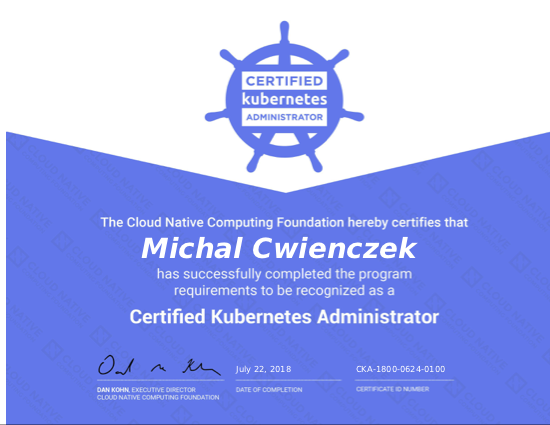CKA learning tips and tricks
I have passed a Certified Kubernetes Administrator exam recently. Here are some tips that should increase your chances in passing the exam. I cannot give you the specific details of the exam as I have signed a confidentiality agreement. However, I hope those few general tips will save you time and make your learning experience more efficient.

Exercise with kubectl
Don’t read the kubectl documentation too extensively. The sooner you put the knowledge into practice, the faster you will be at working with the cluster. Excercise on a live cluster with kubectl and learn the most common commands by heart. The time is of the essence during the exam. Try also to explore different kubectl flags and use them as often as you can.
Bash knowledge is useful
Bash knowledge is very useful during the exam. The exam mostly happens in the bash terminal. Therefore, being able to use bash freely and quickly is important. Using things like tmux or screen can help you as well, but are not necessary to pass the exam.
Know Kubernetes internals
Knowledge about how Kubernetes internal components work will help you solve the puzzles that you will encounter during the exam. However, the theoretical knowledge about Kubernetes internals is not enough to pass the exam. You should have some practice in interacting with different Kubernetes components, such as kubelet, kube-proxy or a control plane.
Know how to troubleshoot Kubernetes
One of the best techniques that I recommend, that should prepare you better for the exam, is breaking things. Try to create, break and then fix the kubernetes cluster. The more isolated and sophisticated way you can invent to break your cluster, the better you will be at identifying problems and fixing them. Remember not to focus on breaking the applications you are deploying - the exam is about cluster administration. Break the cluster itself.
Learn how to backup and restore etcd
Experience with etcd is very important skill for a Kubernetes administrator. Knowing how to back up and restore a cluster from an etcd backup is crucial. In case your cluster encounters utter failure, restoring from etcd backup is your only chance of keeping the cluster alive.
Remember - it’s a practical exam, not a theoretical one
Don’t get involved too much with reading the Kubernetes documentation or intricancies of how Kubernetes works. I found most of online guides to be very theoretical and not reflecting the actual exam curriculum at all. Remember, this is a hands-on exam. This means that you will answer all the questions using bash and kubectl.
Good luck!
If you are taking the exam in the coming weeks, good luck! I hope my post provided some insights and will enable you to choose right study method for the exam.